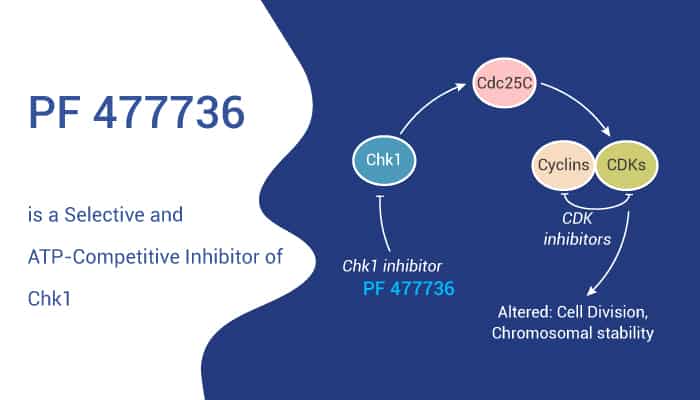Cancer is a multiplicity of diseases characterized by a range of molecular defects leading to unregulated, aberrant cell growth. Checkpoints are present in all phases of the cell cycle. Checkpoints act as gatekeepers maintaining the integrity of the genome. Researchers use anti-tumor agents to treat cancer by imparting damage to the genome and activating cell cycle checkpoints. PF 477736 acts as a potent, selective ATP-competitive small-molecule Chk1 inhibitor with a Ki of 0.49 nM.

PF-00477736 abolishes cell cycle arrest induced by DNA damage and raises cytotoxicity of some chemotherapeutic agents, such as Gemcitabine and Carboplatin. Besides, PF-00477736 abrogates the Gemcitabine-induced S-phase arrest and induces apoptosis. PF-00477736 potentiates the growth-inhibitory activity of Gemcitabine across a broad spectrum of p53-deficient human cancer cell lines in the MTT assay. In addition, PF-00477736 potently inhibits Chk1 enzymatic activity and exhibits a high degree of kinase selectivity. Further, the checkpoint abrogating activity and cytotoxic activity attributed to PF-00477736 in combination with Gemcitabine show selectivity for p53-defective cancer cell lines over p53-competent normal cells.
In vivo, PF-00477736 advances the antitumor activity of Gemcitabine in a dose-dependent manner in xenografts. Moreover, there is no enhancement of systemic toxicity. PF-00477736 potentiates the antitumor activity of gemcitabine with no exacerbation of side effects commonly associated with cytotoxic agents, suggesting selectivity toward cancer cells over normal proliferating cells. Furthermore, PF-00477736 increases Gemcitabine cytotoxicity in a time-dependent manner (4-48 hours). PF-00477736 induces histone H3 phosphorylation and DNA damage and increases apoptosis in vivo
All in all, PF-477736, an inhibitor of CHK1 kinase, overcomes a cell cycle checkpoint induced by Gemcitabine in xenografts models.